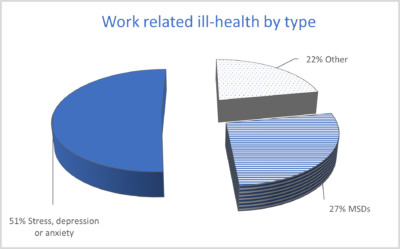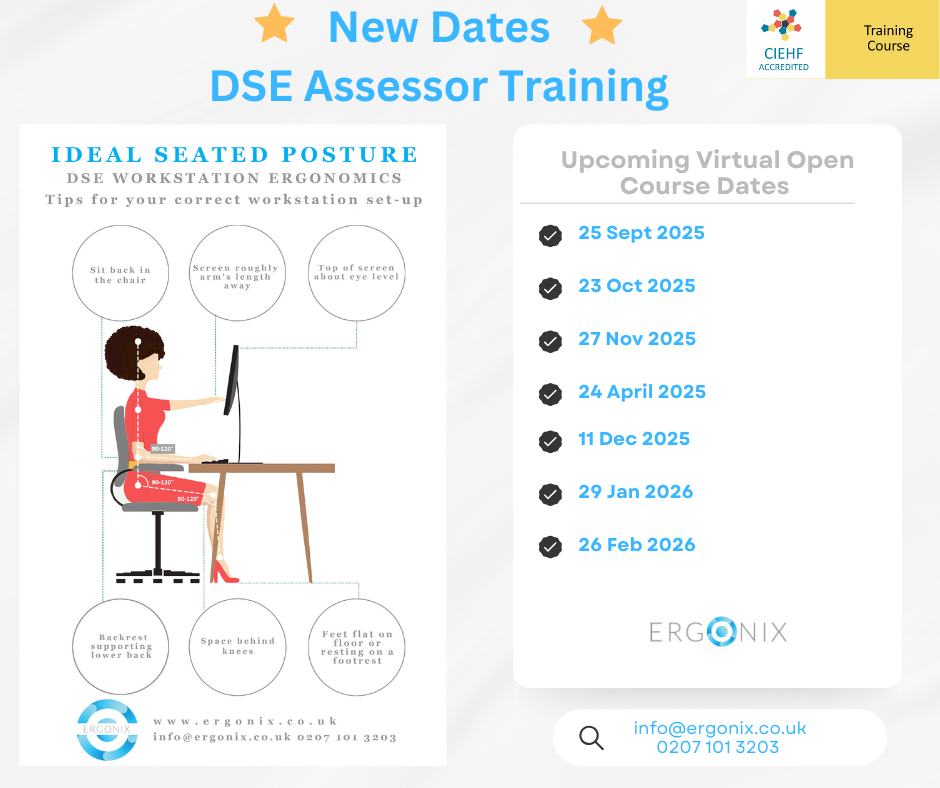 New research from the Health and Safety Executive (HSE) shows that UK firms are now losing 36.8 million working days every year due to employee injury or ill health.
New research from the Health and Safety Executive (HSE) shows that UK firms are now losing 36.8 million working days every year due to employee injury or ill health.
Although Covid-19 has undoubtedly contributed to a rise in absenteeism, that’s only part of the story, as stress, depression, anxiety and musculoskeletal disorders (MSDs) account for the majority of days lost.
Although the biggest cause of absence is stress, depression and anxiety, musculoskeletal disorders (MSDs) are a significant part of the problem, representing more than a quarter of all days lost.
Common, work-related musculoskeletal disorders include back, neck and shoulder pain, carpal tunnel syndrome and tendonitis. Shoulder and neck pain can also lead to recurrent headaches, migraine and poor sleep – all of which can result in time off work. What’s more, stress and anxiety can often be felt in the body, with mental health issues manifesting as physical symptoms, exacerbating the problem even further.
Enormous impact
Clearly, this is a significant problem that is having an enormous impact on UK businesses across all sectors, with productivity, profits, performance and customer satisfaction all being hit. As an employer, is there anything you can do to minimise the harm to your business?
The short answer is yes. When it comes to the health and well-being of your employees, prevention is always better than cure. By taking steps to optimise your team’s working environment, you’ll be able to nip any potential problems in the bud.
In an age where remote working blurs the line between work and home life, it is more important than ever that we prioritise health and wellbeing in our organisations. Investing in well-being leads to increased resilience, reduced sickness absence, better performance and increased productivity.
Improving the working environment
Research shows that 94% of employees see their working environment as a reflection of how they are valued as employees. However, only 39% believe that their working environment has been designed with them in mind.
Echo Research found that employees would feel 62% more motivated if their employers took steps to improve their surroundings, and estimated that they would be 30% more productive as a result.
Ergonomics has a huge role to play in improving the working environment, which in turn, will boost employee health and well-being. A poorly designed workstation can result in posture-related injuries, ill health, sick leave and in some cases may even lead to compensation. By ensuring your employees’ workstations are ergonomically correct, you’ll reduce pain and discomfort, increase efficiency, minimise risk and boost productivity.
Think about your own workstation. Are your eyes sore at the end of the day? Do your wrists hurt from typing? Are your shoulders tense? Ergonomics helps to create a safer, more comfortable working environment, leading to a better workplace experience and improved performance.
Businesses that pay close attention to health and safety in the workplace, and in particular, the ergonomics of their workstations, benefit from:
- Reduced ill-health
- Less risk of musculoskeletal injury
- Increased productivity
- Happier workforce
- Ensure the health and well-being of their staff
If you aren’t yet prioritising ergonomics in your workplace, don’t worry. At Ergonix, we’re here to support you through the whole process, to help ensure the health and well-being of your staff.
Our DSE (Display Screen Equipment) workstation assessments are carried out by chartered physiotherapists with specialist training in ergonomics. We carry out functional workstation assessments which are tailored to each individual’s needs, looking at the relationship between the employee’s posture and the tasks they carry out, to identify existing and potential problems. We can detect the early signs of fatigue and provide advice on preventative exercises and posture changes to help avoid injury and minimise pain. Our specialist assessor will take immediate action to improve the workstations during the assessment, in order to ease musculoskeletal discomfort and improve well-being and productivity.
Every workstation assessment is then followed up with a report setting out our recommendations for change.
We can also carry out remote DSE assessments for homeworkers and take care of any special requirements you may have, such as ensuring safe, fit-for-purpose working environments for employees with disabilities.
Save time and money
Other businesses may be better served by having a fully trained, in-house expert. By training your own staff to perform the role of a DSE assessor, you can save time and money, comply with HSE regulations and also help prevent ill health and absenteeism.
Our one-day DSE workstation assessor training course is accredited by the Chartered Institute of Ergonomics and Human Factors (CIEHF). This interactive course focuses on real-world problem-solving to maximise learning outcomes, and delegates will achieve a CIEHF-accredited certificate.
In business, there are many factors that are beyond our control, including the aftermath of the Covid-19 pandemic and the current economic uncertainty. Both of these are undoubtedly taking their toll on all of us, causing increased levels of absenteeism across all industries.
However, there are factors that we can control. By taking decisive action to improve health and well-being in your workplace, you will be addressing many of the physical root causes of injury and ill health, and as a result, you’ll benefit from reduced absenteeism, better performance, greater productivity and improved staff retention.
To discuss how we can help you to improve the ergonomics in your workplace and ensure employee wellbeing, please get in touch. We’d love to talk.







